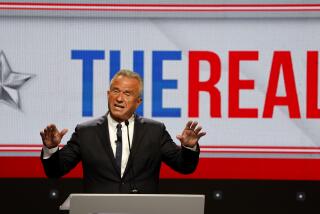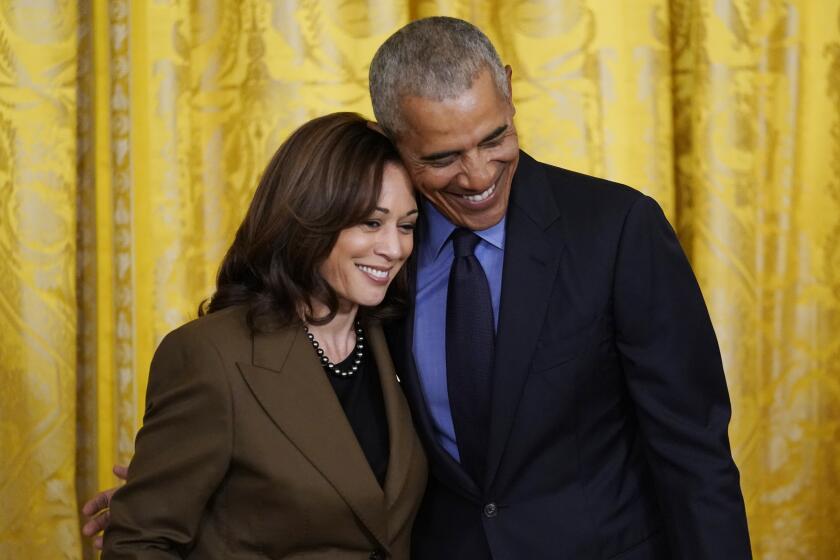Robert C. Mardian, 82; Watergate Figure Was an Ex-Justice Dept. Official
Former Assistant U.S. Atty. Gen. Robert C. Mardian, whose conviction in the Watergate coverup conspiracy was overturned on appeal, has died. He was 82.
Mardian, a Phoenix resident, died of complications of lung cancer Monday at his vacation home in San Clemente, said his son Robert.
Mardian, whom President Nixon named to head the Internal Security Division of the Justice Department in 1970, left the department in May 1972 to work for the Committee to Re-Elect the President, or CREEP, which was being managed by former Atty. Gen. John Mitchell.
The day after the break-in at the Democratic National Committee headquarters at the Watergate complex in Washington, D.C., on June 17, 1972, Mitchell told Mardian that Mardian would be involved with CREEP’s response to the Watergate matter.
Shortly thereafter, Mardian became CREEP’s attorney in a civil suit against it filed by the Democratic National Committee.
Mardian served in that capacity about 30 days before turning the job over to Kenneth Parkinson, a Washington lawyer whose firm handled civil litigation.
Mardian’s actions in that period were a “bone of contention,” Arnold Rochvarg, a professor of law at the University of Baltimore and author of the 1995 book “Watergate Victory: Mardian’s Appeal,” told The Times on Thursday.
Rochvarg said that Mardian interviewed a number of people who had knowledge of, or were involved in, the Watergate break-in, including G. Gordon Liddy, a key figure in the plan to break in to the Democratic Party headquarters at the Watergate.
“Mardian’s defense always was he was doing this as the attorney for CREEP in the civil suit,” said Rochvarg. “The government’s position was he was talking to everybody as a conspirator to obstruct justice.”
In March 1974, Mardian and six others -- Mitchell, top White House aides H.R. Haldeman and John D. Ehrlichman, Parkinson, Charles W. Colson, a former special counsel to Nixon; and Gordon Strachan, assistant to Haldeman -- were indicted. Five went to trial.
In the indictment, Mardian was charged with one count of conspiracy to obstruct justice.
The others, Rochvarg said, were charged on a variety of counts, including perjury and obstruction of justice.
During the high-profile Watergate trial presided over by U.S. District Judge John Sirica, Mardian contradicted much of the testimony that the prosecution’s witnesses had made against him.
Mardian denied, among other things, that Mitchell had directed him to tell Liddy to ask Atty. Gen. Richard Kleindienst to get the men who had been arrested at the Watergate out of jail.
He also denied that he had heard Mitchell order the destruction of Watergate documents.
On New Year’s Day of 1975, Mardian, Mitchell, Ehrlichman and Haldeman were convicted. Parkinson was acquitted.
Mardian was sentenced to not less than 10 months and not more than three years in prison. All four men were free pending appeal.
In October 1976, a federal appeals court upheld the convictions of Mitchell, Ehrlichman and Haldeman but reversed Mardian’s conviction and ordered a new trial, saying that he should have been tried separately.
Three months later, Special Prosecutor Charles Ruff announced that Mardian would not be required to stand trial a second time.
Ruff, the Associated Press reported at the time, said in a motion that the passage of time “makes the task of reconstructing the government’s case more difficult than it would have been following the original trial.”
At the time, Mardian was serving as vice president and general counsel for the Mardian Construction Co. in Phoenix.
“It’s pretty late to do any correcting of the record,” Mardian told the Arizona Republic in 1999, “but I think the opinion of the appellate court was pretty clear that I shouldn’t have been convicted.”
Mardian, who was then corporate counsel to the Western Building Division of Perini Corp., cited a tape of a Sept. 15, 1972, conversation in which Nixon, Haldeman and press secretary Ron Ziegler discussed attempting to keep Mardian at bay.
“They’re not talking about a co-conspirator,” Mardian said in the 1999 interview, “They’re talking about a lawyer trying to get the facts.”
Rochvarg, who as a law clerk was part of the team that worked on Mardian’s appeal, wrote in his book that he believed that Mardian should not have been convicted.
But, he said Thursday, “the case is extremely complex and you still read different variations of what happened. There’s all kinds of different theories of exactly who knew what when. So it’s impossible to come to any absolute conclusions.”
The youngest of 11 children, Mardian was born in Pasadena on Oct. 23, 1923. During his freshman year at UC Santa Barbara, he joined the U.S. Naval Reserve after the Japanese bombed Pearl Harbor. He was called into active duty in June 1942.
After the war, he graduated with honors from USC law school in 1949 and opened a law office in Pasadena.
Mardian served as western regional director for Sen. Barry Goldwater’s presidential campaign in 1964 and was chairman of Ronald Reagan’s advisory committee during his 1966 California gubernatorial campaign. In 1968, he was the western states co-chairman for Nixon’s presidential campaign.
After Nixon’s inauguration, Mardian became general counsel to what was then the Department of Health, Education and Welfare and later was appointed to be executive director of the Cabinet Committee on Education.
In addition to his son Robert, Mardian is survived by his wife of 60 years, Dorothy; sons Bill and Tony; brothers Samuel and Daniel; his sister, Florence Gertmenian; and 10 grandchildren.
More to Read
Get the L.A. Times Politics newsletter
Deeply reported insights into legislation, politics and policy from Sacramento, Washington and beyond. In your inbox three times per week.
You may occasionally receive promotional content from the Los Angeles Times.






